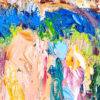Can photography be a tool for social justice? Lynn Savarese, award-winning New York photographer, shows us how. In addition, we learn from Lynn how to move from a corporate career to life as a successful full-time artist.
Does art have the power to change the world? Can it be a means to advance positive social change? The historical record is well-established — the answer is an emphatic yes.
Think Vietnam War-era protest songs, photos and videos of the civil rights marches, provocative feminist performance art, and the AIDS Quilt. These works touched the soul of the nation. They moved people to act with an urgency that well-reasoned speeches and newspaper articles couldn’t always achieve.
A great artist
We had the opportunity to meet an artist who is demonstrating the impact that photography can have in the difficult and ongoing work of social justice. She also shared some practice advice on how to move from corporate career to life as artist.
Her name is Lynn Savarese, and her story is incredible.
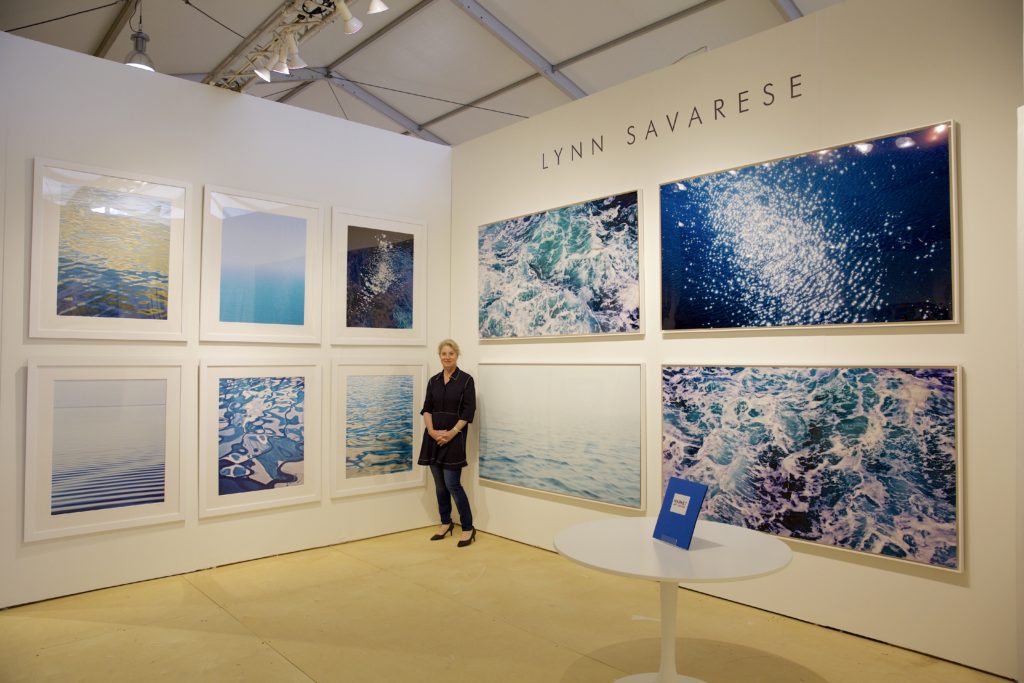
Lynn Savarese at the Hamptons Art Fair brings social justice in her photography. Photo Credit: Lynn Savarese
lynn savarese
Originally from a small town in Texas, Lynn Savarese resided and traveled throughout the world before making New York City her home in the early 1980’s following her graduation from Harvard Law School.
After careers in corporate law and investment banking and a lengthy sabbatical to raise her family and pursue volunteer work for various human rights organizations, Lynn found her passion—photography—several years ago. Since then, her photography has appeared in numerous galleries, art fairs, and other exhibitions and publications throughout the world. She has also won several major international prizes and honors. This includes being selected as a Finalist in the 2016 Magnum Photography Awards competition.
Lynn also frequently works with not-for-profit organizations to help further their missions through strategic photography projects. As the co-founder of and photographer for The New Abolitionists Campaign, a groundbreaking project to fight human trafficking, she has received a number of awards and honors for her humanitarian work. To see more of Lynn’s work, you can visit her website, lynnsavarese.com, and her Instagram accounts at @lynnsavaresephotography and @savareseh2o.
Her journey
On a bright late-November morning, we sat down in Lynn’s lovely Manhattan apartment. We settled into her library, which has magnificent floor-to-ceiling shelves overflowing with the family’s books and Lynn’s collection of boxes (more about that later), to talk about her work as an artist. And about how – in the right hands – photography can be a vital element of positive social change.
how to move from corporate role to full-time artist
For starters, we wanted to know how a former corporate lawyer and M&A banker becomes an award-winning artist.
1. start with a personal passion or hobby and learn more
Lynn explains: “I was always the one in my family who took the photos of family trips and special occasions. But as I had no real knowledge of how to operate a camera, I was often disappointed with my images. So I decided to take a beginning photography course at the 92nd Street Y.
That’s where I learned the importance of ditching the automatic settings and learning how to set everything manually. That’s where I learned about aperture, shutter speed, and ISO settings, and what different lenses could achieve.” She smiles at the memory. “I don’t want to be overly dramatic, but learning to properly use a camera was truly cathartic – allowing me to see the world in a way I never had before.”
2. be patient until you find your true calling
It’s clear that this was a seminal moment in her life. “I used to envy people who had found their passion – who said that they could work for 12 hours straight and not even notice. I resented it when people would say ‘just find your passion’ – it felt like telling someone who’s lonely and wants to marry to just walk out on the street and find a husband.”
3. build your skills
The thrill of this new way of seeing drove her to sharpen her eye and strengthen her newfound skills.
“I spent a lot of time taking photos at the Metropolitan Museum. A lot of people don’t know this, but three days a week, you can register at the front desk and photograph using a tripod there. It’s an ideal place to practice: beautiful subjects, perfectly lit, that remain perfectly still and don’t get impatient!
So I would take photos of these small figurines in glass cases that you wouldn’t even notice when you’re passing through the museum. And then I would develop the photos and enlarge them, and gasp at the extraordinary detail that was revealed. Small figurines are especially photogenic and exquisite subjects to photograph.
When I go to the Met now, I feel that I have all these friends and intimate connections there. I have seen, up close, the mischievous grin on that little Buddha, and I have delighted in viewing, up close, the vital energy of a small clay dancing warrior—quite like an Alvin Ailey dancer—but that was crafted thousands of years ago. And I would not have noticed any of these wondrous characters but for my camera.”
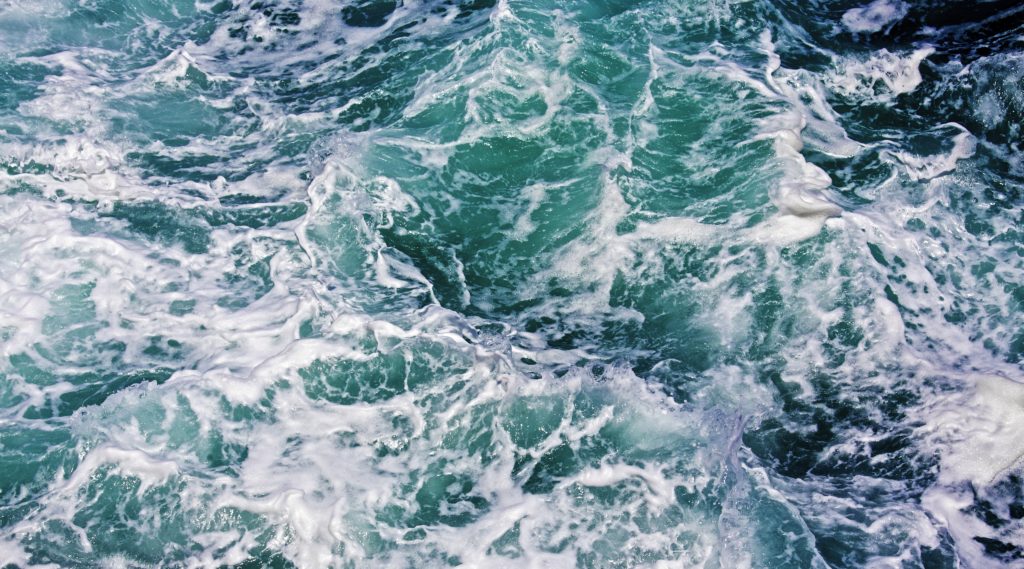
Tumult I brings social justice in photography. Photo Credit: Lynn Savarese
4. work for free if you can (even if the work seems dull)
Lynn is extremely modest about how her career as an artist advanced after this solo apprenticeship. “An opportunity sort of fell into my lap. A friend told me about a volunteer project at the American Museum of Natural History. They needed photographs of every item in the storage facilities of their Education Department so that they could create a digital archive. They had tons of things that they didn’t really know they had. I was randomly assigned three cabinets, and was supposed to take ‘mug shots’ of whatever was inside – nothing artistic, just a record of what was there.”
5. when opportunity arrives, seize it
On the first day of my volunteer assignment, “I opened the cabinets, and they were filled with dead birds. Taxidermied birds, in various states of disrepair.” She began photographing them, and as she did, she began to feel a bond with them.
“It was really quite poignant. I started thinking that these poor birds had essentially been killed twice: once when they were taxidermied – killed at the prime of their lives, at the height of their beauty, for public display– ironically killed in order to be immortalized. But then they weren’t publicly displayed after all – and instead were stowed away in a cabinet. And so for me, it was as if they had been killed a second time. I felt an intense need to honor them, to pay tribute to them, because even though they were now neglected and often damaged objects– flawed replicas of their living selves. They remained eerily and stunningly beautiful.”
Photos from that project became the first works that she sold as an artist, and they have continued to garner extraordinary recognition, having been selected to be featured in exhibitions worldwide, and as a Finalist in the 2016 Magnum Photography Awards competition. She laughs: “All because of a serendipitous adventure that came my way.”
As we listen, we observe to ourselves that many people may have luck come their way – but not all grab hold of it and do something brilliant with it. And even fewer do it with genuine humility and grace, as Lynn has done. But we digress.
6. pursue every chance to build your skills
In a completely different milieu, Lynn had an additional opportunity to hone her skills early on as an emerging photographer. “The super high-end social event planner David Monn was looking for someone to photograph the decor for his events. He had other photographers taking pictures during the actual party, but he wanted shots of the pre-party set up. So I photographed one of his events on spec – if he liked the work, he would pay me. And thankfully, he did end up liking my work. I ended up photographing numerous events for him over the next several years.”
7. partner with other inventive and adventurous people
Lynn notes: “David Monn’s set-ups are incredibly elaborate and inventive—true works of art in themselves. Photographing them taught me a lot.” She shares a copy of the 2016 coffee-table book David Monn: The Art of Celebrating, filled with photos taken by her, and they’re stunning: magical scenes resplendent with dramatically-lit tables, cascading arrangements of flowers, fruits and vegetables, blossoming trees with mounted doves and peacocks perched in their branches, multi-tiered cakes, and the like.”
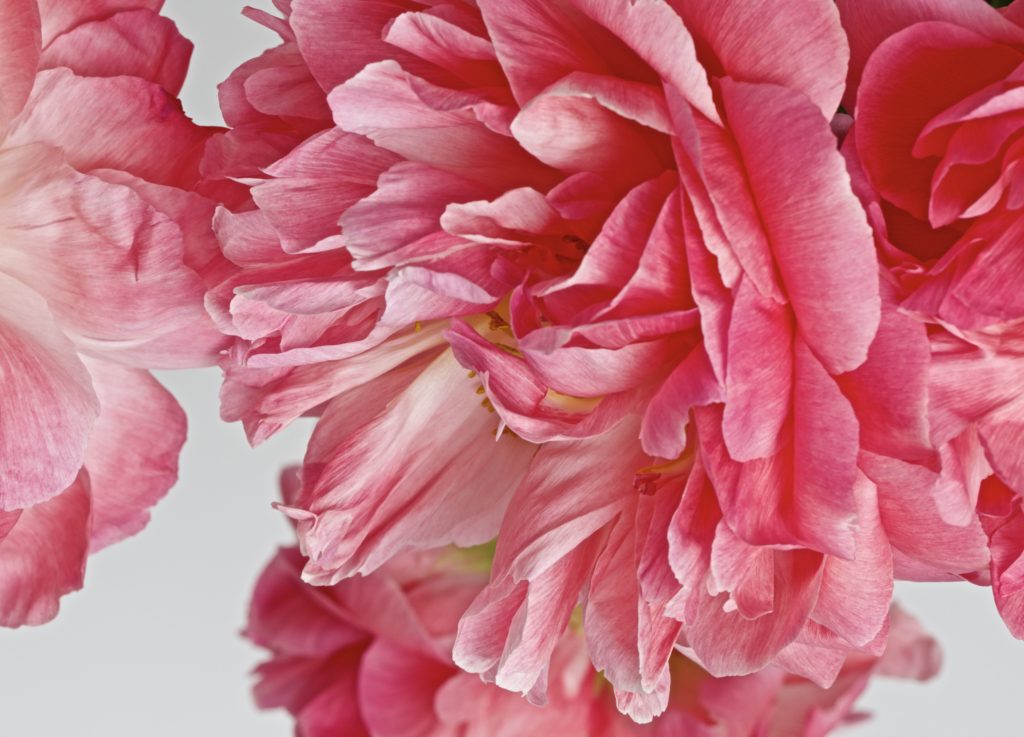
Mother’s Day Peony. Photo Credit: Lynn Savarese
8. go deep into what really intrigues you
One of Lynn’s enduring subjects is water. To capture it, she has traveled from the Adirondacks and Nantucket to the Maldives and the Caribbean, and from Iceland and Argentina to Louisiana’s bayous and the Hamptons.
“Water is loved deeply in all of its manifestations, and we all seek it out wherever we are—from urban water fountains to lake fronts, from baths to oceans. Whether calm or turbulent, gently lapping or crashing in frothy tumult, water soothes and excites us, inspires and comforts us. I’ve been very fortunate to spend a lot of time on Nantucket, and in the Adirondacks, the Hamptons, and the Caribbean, and many of the photos in my various ‘water’ series were taken there.”
The works are mesmerizing in their color and range: from intensely rich abstractions to raging tempests. She also showed us black and white prints from a stunning series taken at Iguazu Falls, on the border of Argentina and Brazil, as heroic in their dramatic rendering as Ansel Adams’ iconic photos of the American West. “I spent four days doing nothing but photographing these falls.”
9. preserve your work and memories as you go
We felt an electric charge watching the artist reverently remove the Iguazu Falls images from the box in which they’re stored. Each image is covered in a veil of protective paper that she sweeps aside with a sense of ceremony. It’s truly an unveiling.
Something about it moved us to mention the joys of watching someone open a box — or opening one ourselves. It’s an incredible feeling of anticipation, curiosity, surprise and delight. “I know!” Lynn exclaimed. “That’s why I collect boxes!” She gestured to the shelves in the library and we noticed that she does, indeed, have many boxes nestled among the books.
We totally want to start doing that now.
photography as a tool for social justice
As engaged as she is when describing her other work, it’s clear that Lynn’s deepest passion is the power of art to facilitate social change. Finding ways to use photography as a tool for social justice has been a driving passion of Lynn’s work.
the new abolitionists project
In 2013, she and Dorchen Leidholdt—an extraordinary longtime human rights activist leader– launched the New Abolitionists Campaign. This campaign is a groundbreaking photography project to combat human trafficking that features powerful portraits of prominent and influential individuals—artists and entertainers, major sports figures, lawmakers and other key government officials, faith-based leaders, social justice advocates, philanthropists, and business leaders—alongside images of courageous survivors of modern-day slavery.
photographing prominent new abolitionists
In addition to photographing over 70 brave survivors of human trafficking, Lynn has photographed numerous luminaries who’ve signed on as New Abolitionists, including former US Attorneys General Lynch and Holder, US Senators Schumer and Gillibrand, NYC Mayors Bloomberg and Dinkins, Meryl Streep, Tina Fey, Lin-Manual Miranda, Gloria Steinem, Agnes Gund, and dozens of others.
The New Abolitionist Campaign played a vital role several years ago in the adoption of New York State’s Trafficking Victims Protection and Justice Act. The Campaign aims to promote legislative reform in other states and at the federal level as well.
Enlisting iconic leaders in various fields of endeavor for the Campaign has had real impact. Agreeing to be featured and honored as a “New Abolitionist” often deepens their investment in the cause, while also helping raise the profile of the issues that need to be addressed.
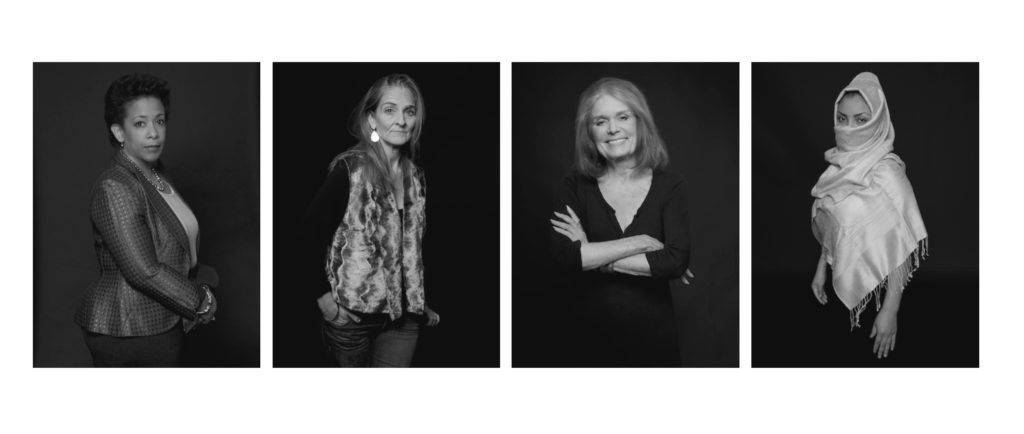
The New Abolitionists.
photographing survivors
The photographs of the survivors of human trafficking themselves have been especially transformative. “These are girls, women, and men who were abducted into sexual slavery, often at the ages of 12-15. They are the heart and soul of our Campaign.
For them to see their portraits displayed alongside icons like football legend Curtis Martin or Meryl Streep, is incredibly empowering for them, and for other young people who see the work.”
The New Abolitionist portraits have been exhibited in a number of different venues. This includes the International Center of Photography, the Paley Center, and Harvard Law School. “I was especially honored and pleased to have our New Abolitionists selected for exhibition at Photoville—one of the largest and best-attended photography fairs in the country, with over 75,000 visitors in attendance, including kids from public schools throughout the five boroughs of New York City.”

Tempest in Tiffany Blue. Photo Credit: Lynn Savarese
leaving a legacy
It’s thrilling to talk with someone who has clearly found her true calling, and exciting to imagine what comes next. Lynn is exploring the world of art shows and art fairs. She has shown her work at the Hamptons Market Art + Design Fair, the Architectural Digest Design Show, and the Affordable Art Fair in New York. She plans to do so again —and she also enjoys commissioned projects.
As we conclude our time together, Lynn shows me some of the works that will be her legacy for her children.
Legacy works for her children
One is called Vestments. It’s comprised of six handmade cloth-bound books. Each book contains a series of photographs of carefully cropped “swatches” of fabric appearing in the clothing and vestments found in religious paintings on display at the Louvre and the Met.
Ripples and folds of fabric, fine details from a veil or skirt, a hand grasping an ornate cloak. Those are some of the many textile images pulled out of ancient paintings and rendered anew as brilliantly-pigmented and sculpted abstract images.
“This is what I’ll leave behind. My grandmother left me a set a quilts that she had sewn by hand. I won’t be leaving quilts, but I’ll be leaving something I made with my own hands.”
We leave our conversation in the artist’s aerie and head back to the workaday world. We are quite certain that Lynn Savarese will be leaving behind so much more.
And fortunately for us, not all of it will be left to her family alone. Among the gifts she has already given us: a lesson in how to live a rich life – full of ideas, creativity, the pursuit of justice, and the celebration of beauty.
Imagine if we could all live that way. Imagine what would happen if at least we all tried. Like Lynn, we might begin to see the world in an entirely new way.
Can Photography Be a Tool for Social Justice?
To see Lynn’s New Abolitionist portraits and to learn more about the New Abolitionists Campaign, please visit http://thenewabolitionists.com/, https://www.facebook.com/newabolitionists/, @newabolitionists on Instagram, and @NYAbolitionists on Twitter.



